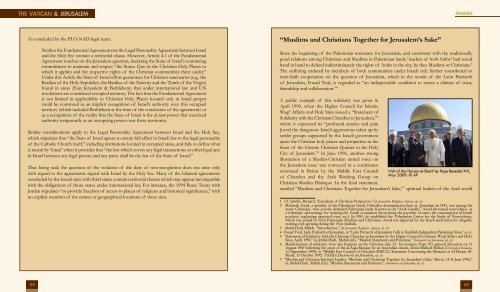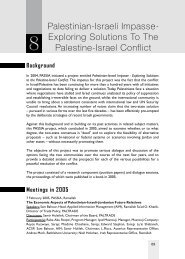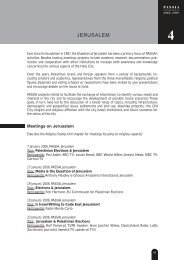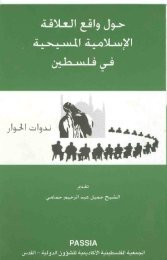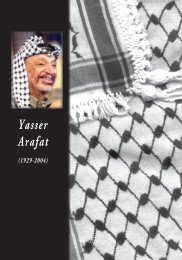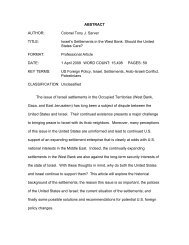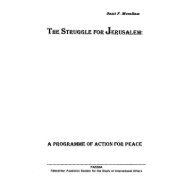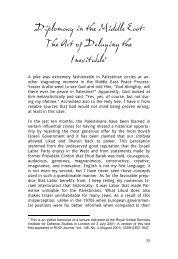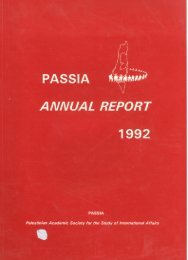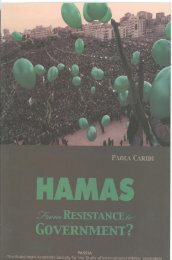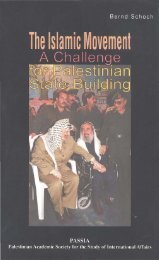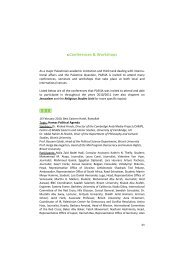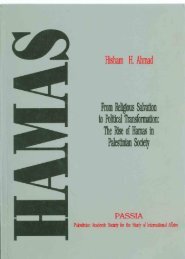<strong>The</strong> Vatican & <strong>Jerusalem</strong>annexesAs concluded by the PLO-NAD legal team:Neither the Fundamental Agreement nor the Legal Personality Agreement between Israeland the Holy See contain a territorial clause. However, Article 4.1 of the FundamentalAgreement touches on the <strong>Jerusalem</strong> question, declaring the State of Israel’s continuingcommitment to maintain and respect “the Status Quo in the Christian Holy Places towhich it applies and the respective rights of the Christian communities there under.”Under this Article the State of Israel offers guarantees for Christian sanctuaries (e.g., theBasilica of the Holy Sepulcher, the Basilica of the Nativity and the Tomb of the Virgin)found in areas (East <strong>Jerusalem</strong> & Bethlehem) that under international law and UNresolutions are considered occupied territory. <strong>The</strong> fact that the Fundamental Agreementis not limited in applicability to Christian Holy Places located only in Israel propercould be construed as an implicit recognition of Israel’s authority over this occupiedterritory (which included Bethlehem at the time of the conclusion of the agreement) oras a recognition of the reality that the State of Israel is the de facto power that exercisedauthority temporarily as an occupying power over these territories.Similar considerations apply to the Legal Personality Agreement between Israel and the Holy See,which stipulates that “the State of Israel agrees to assure full effect in Israeli law to the legal personalityof the Catholic Church itself,” including institutions located in occupied areas, and fails to define whatis meant by ‘Israel’ when it provides that “the law which covers any legal transactions or other legal actsin Israel between any legal person and any party shall be the law of the State of Israel.”That being said, the question of the violation of the duty of non-recognition does not arise onlywith regard to the agreements signed with Israel by the Holy See. Many of the bilateral agreementsconcluded by the Israeli state with third states contain territorial clauses which may appear incompatiblewith the obligations of those states under international law. For instance, the 1994 Peace Treaty withJordan stipulates “to provide freedom of access to places of religious and historical significance,” withno explicit mention of the names or geographical locations of these sites.“Muslims and Christians Together for <strong>Jerusalem</strong>’s Sake”Since the beginning of the Palestinian resistance for <strong>Jerusalem</strong>, and consistent with the traditionallygood relations among Christians and Muslims in Palestinian lands, 1 leaders of both faiths 2 had stoodhand in hand to defend indiscriminately the rights of Arabs in the city, be they Muslims or Christians. 3<strong>The</strong> suffering endured by members of both communities under Israeli rule further contributed tointer-faith cooperation on the question of <strong>Jerusalem</strong>, which in the words of the Latin Patriarchof <strong>Jerusalem</strong>, Fouad Twal, is regarded as “an indispensable condition to create a climate of trust,friendship and collaboration.” 4A public example of this solidarity was given inApril 1990, when the Higher Council for IslamicWaqf Affairs and Holy Sites issued a “Statement ofSolidarity with the Christian Churches in <strong>Jerusalem</strong>,” 5where it expressed its “profound anxiety and pain[over] the dangerous Israeli aggressions taken up bysettler groups supported by the Israeli governmentupon the Christian holy places and properties in theheart of the historic Christian Quarter in the HolyCity of <strong>Jerusalem</strong>.” 6 In June 1996, another strongillustration of a Muslim-Christian united voice onthe <strong>Jerusalem</strong> issue was conveyed in a conferenceconvened in Beirut by the Middle East Council Visit of the Haram al-Sharif by Pope Benedict XVI,of Churches and the Arab Working Group on May 2009. © APChristian-Muslim Dialogue. In the final statement,entitled “Muslims and Christians Together for <strong>Jerusalem</strong>’s Sake,” 7 spiritual leaders of the Arab world1 Cf. Sabella, Bernard. “<strong>Jerusalem</strong>: A Christian Perspective,” in <strong>Jerusalem</strong>: Religious Aspects, op. cit.2 Mubarak Awad, a member of the Palestinian Greek Orthodox denomination born in <strong>Jerusalem</strong> in 1943, was among themany Christians who actively defended Palestinian lands. Known as the “Arab Gandhi,” Awad advocated nonviolence asa technique and strategy for resisting the Israeli occupation (boycotting the payment of taxes, the consumption of Israeliproducts, replanting uprooted trees, etc.). In 1983, he established the Palestinian Centre for the Study of Nonviolence,which was joined by both Palestinian Muslims and Christians. Awad was deported by the Israeli authorities for allegedlyinciting civil uprising during the First Intifada.3 Abdul-Hadi, Mahdi. “Introduction,” in <strong>Jerusalem</strong>: Religious Aspects, op. cit.4 Fouad Twal, Latin Patriarch of <strong>Jerusalem</strong>, in “Latin Patriarch of <strong>Jerusalem</strong> Calls to Establish Independent Palestinian State,” op. cit.5 “Statement of Solidarity with the Christian Churches in <strong>Jerusalem</strong> by the Higher Council for Islamic Waqf Affairs and HolySites, April 1990,” in Abdul-Hadi, Mahdi (ed.). “Muslim Statements and Positions,” Documents on <strong>Jerusalem</strong>, op. cit.6 Manifestations of solidarity were also frequent on the Christian side. Cf. for instance: Pope VI’s general allocution on 31August 1969 following the arson of the al-Aqsa Mosque by an Australian citizen, Denis Michael Rohan (Osservatore Romano,1-2 September 1969); or “Middle East Council of Churches (MECC), Statement Concerning the Massacre at Al-Haram Al-Sharif, 11 October 1990,” <strong>PASSIA</strong> Documents on <strong>Jerusalem</strong>, op. cit.7 “Muslim and Christian Spiritual Leaders, ‘Muslims and Christians Together for <strong>Jerusalem</strong>’s Sake,’ Beirut, 14-16 June 1996,”in Abdul-Hadi, Mahdi (ed.). “Muslim Statements and Positions,” Documents on <strong>Jerusalem</strong>, op. cit.88 89
<strong>The</strong> Vatican & <strong>Jerusalem</strong>annexes(both Muslim and Christian) reasserted that no faith or political authority could claim exclusivity in thecity and stated that “no power in the world ha[d] the right to judaize <strong>Jerusalem</strong>, internationalize it, ordeprive it of its Arab and Christian-Muslim character.” 8However, beyond the common opposition to the Israeli policies and practices of Judaization, a sourceof disagreement between the two communities on the question of <strong>Jerusalem</strong> has been the conceptof international guarantees, as advocated by the Christians. <strong>The</strong> position of the Muslim world hasfluctuated with regard to the possibility of providing international safeguards, mostly preferringPalestinian sovereignty over the whole of the Palestinian territories occupied in 1967 “including Al-Quds Al-Sharif, the Holy Haram in Al-Quds Al-Sharif and all Christian and Muslim holy places, whichare part of the Palestinian territories occupied since June 1967.” 9 This divergence on the question ofinternationalization has also complicated Catholic-Muslim relations at the Vatican level, as illustratedby the episode of the Tripoli Seminar in 1976. This ‘Seminar on Islamic-Christian Dialogue,’ whichwas significantly the first event of this kind where the political question of Palestine was discussedbetween the Catholic Church and the Muslim world, 10 was a failure insofar as the Holy See refusedto endorse two paragraphs of the final statement, including Paragraph 21, which affirmed the “Arabcharacter of the city of <strong>Jerusalem</strong> and rejecte[ed] plans to Judaize or internationalize it.” 11To improve the dialogue and cooperation with the Muslim world on this issue, parallel to the effortsof rapprochement between the faiths undertaken at the head of the Church under the pontificate ofJohn Paul II, Palestinian Christians have sought to better explain their interpretation of the idea of aspecial status that is internationally guaranteed. Thus, following a controversy raised by a number ofChristian statements made during the 2000 Camp David negotiations, the Chancellor of <strong>Jerusalem</strong>’sLatin Patriarchate, Raed Awad Abu Sahlieh, clarified what the local Church of <strong>Jerusalem</strong> meant byinternational guarantees:It is not an internationalization of the city, as some have understood or explained it.Rather, we demand to have an international body like the United Nations that guaranteesthe timely implementation of all future agreements. After all, historical experiencehas taught us that ‘there are no sacred dates and no sacred covenants’ for the Israeliside. Finally, [as regards] the concept of ‘protection’ or ‘guarantees’ […] we do not saythat there must be a physical presence of international forces to protect the Old Cityor administer it nor do we mean that the Christian side, owing to its small numbers, isafraid about its future or asks for protection because it feels weak or persecuted. No! 12As a matter of fact, for the Christian communities, what matters the most (in addition to thepreservation of the elements which compose the spiritual dimension of <strong>Jerusalem</strong>) is that they areregarded on the political side as equal citizens without special claims or any need for special privileges.“When the Christian religious leaders demanded to take part in any negotiations concerning thefinal status of the city of <strong>Jerusalem</strong>,” explained Abu Sahlieh, “they did not want to become a thirdparty but simply requested that their opinion should be taken into consideration.” This desire tobe regarded not as “a third party, […] not a weak party either, but […] an integral component ofPalestinian society” has been acknowledged on several occasions by Palestinian leaders, who insistedthat they “don’t deal with the Catholic Church as strangers but part of [their] social fabric.” 13 Italso manifested itself in the adoption of a shared position on the issue of sovereignty and politicaladministration of the city, with Christian religious leaders expressing on several occasions theirpreference for Palestinian rather than Israeli rule 14 and explicitly stating that “East <strong>Jerusalem</strong> mustgo back to the Palestinians and be under their complete Palestinian sovereignty and become thecapital of the future state.” 15 Beyond the question of <strong>Jerusalem</strong>, this support of the local Churchfor the national cause has again been demonstrated by the Palestinian membership bid at theUnited Nations in September 2011. Several Palestinian Christian clergies declared their “support[for] the diplomatic efforts made to achieve international recognition of the state of Palestine,” 16including the local Catholic Church, which (through the voice of Patriarch Twal) called to establishan independent Palestinian state based on the two-state solution around 1967 borders. 178 A further symbol of inter-faith cooperation on the issue of <strong>Jerusalem</strong> was the establishment in 2008 of the Islamic-ChristianCommission in Support of <strong>Jerusalem</strong> and the Holy Sites.9 “Final Communiqué of the Meeting of the Expanded Extraordinary Executive Committee Meeting on the Israeli AggressionsAgainst the Blessed Al Aqsa Mosque,” Organisation of Islamic Cooperation, 1 November 2009. http://www.oic-oci.org/topic_detail.asp?t_id=2936.10 As opposed to Zionist groups, which had taken the opportunity to further their political goals through the opening of theNostra Aetate declaration, such a form of lobbying within the Vatican on behalf of Muslim representatives had been absent.<strong>The</strong> Commission for Relations with Muslims, set up in the framework of the Secretariat for Relations with non-Christians,did not become a political tool for the advancement of the Palestinian cause. Similarly, until the Tripoli Seminar, the discussionsbetween the Holy See and Muslim leaders concerned only the theological level (Rokach, op. cit.).11 <strong>The</strong> other controversial paragraph, rejected by the Holy See, was Paragraph 20, which (referring to the Israeli-Palestinianconflict) stated that: “the two parties [...] distinguish between Zionism and Judaism, considering Zionism an aggressive, racistmovement, alien to Palestine and the whole Levant.” Qtd. in Rokach, op. cit., pp. 133-135.12 “Chancellor of the Latin Patriarchate of <strong>Jerusalem</strong>, Statement on the Church’s Position on the Final Status of <strong>Jerusalem</strong>,<strong>Jerusalem</strong>, August 2000,” <strong>PASSIA</strong>, Documents on <strong>Jerusalem</strong>, op. cit.13 “President Abbas reaffirmed that Christians from the Holy Land are an integral part of the Palestinian people. <strong>The</strong> emigrationof Christians from Palestine unacceptably alters our national composition and gravely damages the prospects ofour future state.” Press Release of the Palestine Liberation Organization, Negotiations Affairs Department: “PresidentAbbas: ‘We join the Synod in their call to uphold the values of freedom, dignity and justice by ending the Israeli occupation,’”op. cit.14 Dumper, Michael. “<strong>The</strong> Christian Churches of <strong>Jerusalem</strong> in the Post-Oslo Period,” op. cit.15 “Chancellor of the Latin Patriarchate of <strong>Jerusalem</strong>, Statement on the Church’s Position on the Final Status of <strong>Jerusalem</strong>,<strong>Jerusalem</strong>, August 2000,” op. cit.16 Kerr, David. “Vatican Remains Neutral on Palestinian UN Membership Bid”, Catholic News Agency, 19 September 2011.http://www.catholicnewsagency.com/news/vatican-remains-neutral-on-palestinian-un-membership-bid/.17 “Latin Patriarch of <strong>Jerusalem</strong> Calls to Establish Independent Palestinian State,” WAFA (Palestinian News and InformationAgency), 6 May 2012. http://english.wafa.ps/index.php?action=detail&id=18446.90 91


